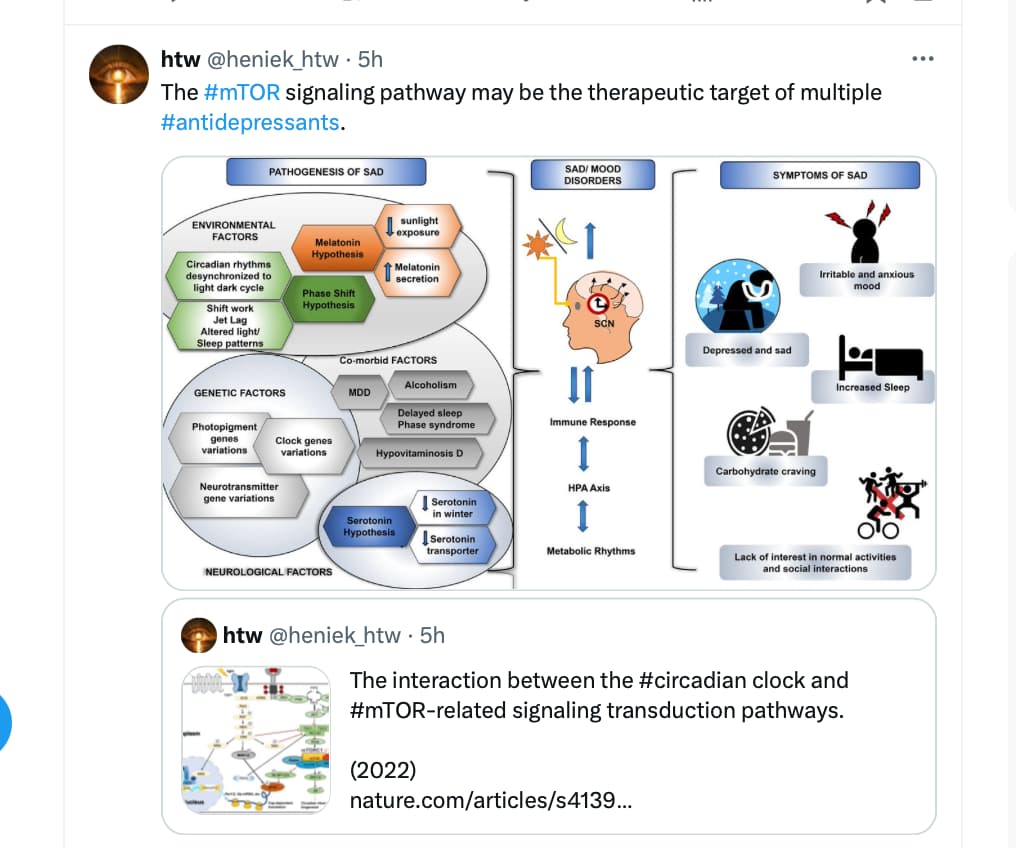Just saw this on twitter… perhaps why rapamycin can impact sleep for many of us when its taken later in the day?
Circadian (~24 h) rhythms in physiology and behavior are evolutionarily conserved and found in almost all living organisms. The rhythms are endogenously driven by daily oscillatory activities of so-called “clock genes/proteins”, which are widely distributed throughout the mammalian brain. Mammalian (mechanistic) target of rapamycin (mTOR) signaling is a fundamental intracellular signal transduction cascade that controls important neuronal processes including neurodevelopment, synaptic plasticity, metabolism, and aging. Dysregulation of the mTOR pathway is associated with psychiatric disorders including autism spectrum disorders (ASD) and mood disorders (MD), in which patients often exhibit disrupted daily physiological rhythms and abnormal circadian gene expression in the brain. Recent work has found that the activities of mTOR signaling are temporally controlled by the circadian clock and exhibit robust circadian oscillations in multiple systems. In the meantime, mTOR signaling regulates fundamental properties of the central and peripheral circadian clocks, including period length, entrainment, and synchronization. Whereas the underlying mechanisms remain to be fully elucidated, increasing clinical and preclinical evidence support significant crosstalk between mTOR signaling, the circadian clock, and psychiatric disorders. Here, we review recent progress in understanding the trilateral interactions and propose an “interaction triangle” model between mTOR signaling, the circadian clock, and psychiatric disorders (focusing on ASD and MD).
https://www.nature.com/articles/s41398-022-02120-8
https://x.com/heniek_htw/status/1774126308080951622?s=20
3 Likes
Possibly, but not entirely.
Our circadian rhythms can be influenced by so much…
At the molecular level the autonomous oscillator function of circadian clocks is mediated via feedback loops involving positive and negative elements. There are WAY too many elements that could be altered by mTOR, Stress/alterations in gene expression caused by MD/ASD, and not to mention we still don’t understand how much impact circadian dysfuntion truly contributes to these diseases vs secondary dysfunction as a result of these diseases.
I have mentioned this before, but circadian rhythms control the timing of sleep, not so much directly changing sleep archetecture(although there is mixed thoughts on this topic in the field). There are two processes regulating sleep, the circadian process and the homeostatic process. As mentioned earlier, the Circadian Process regulates the timing of when you sleep, while the homeostatic process regulates your drive/need to sleep(i.e. the longer we stay awake, the greater our drive/need to sleep). We aren’t really clear on how much one process influences the other, for the most part the consensus is that the two processes are independent of each other. Yet, there are some instances where one influences the other(such as mutations in BMAL or CLOCK genes altering sleep), although a brillant experiment in the past showed that they are mostly independent. As i said before, your circadian process determines when one sleeps. If you sleep deprive animals during their normal sleep period(we will use mice as an example: so you sleep deprive mice during the day when they typically would be sleeping) and end the sleep deprivation at the point where those same animals circadian process would be driving wake(Mice are awake during the night, so you end sleep deprivation right as their night begins) the question becomes what process will take precedence over the other? In other words, does the circadian process(the drive to be awake) override the homeostatic process(the drive to be asleep)? What studies have shown is that the sleep derpived animals will go to sleep, indicating that the homeostatic process is not dependent of the circadian process. Not to mention, when it comes to circadian rhythms, we still do not entirely understand how much circadian dysfuntion is deterimental. Yes, disrupting your circadian rhythms can increase risk to develop certain diseases(which is typically dependent on the how many years you are disrupting your circadian rhythms), yet there are many shift workers who remain perfectly fine after many years.
All of this to say, there are too many variables to make any conclusions. This is all not even considering psychiatric disorders in the equation, which is their relationship is ALL over the place and dependent on the specific disorder when it comes to their relationship with sleep/circadian rhythms. Also factor in that many authors fail to completely exclude the influence of sleep or circadian process on the outcome of studies, complicating findings…
4 Likes
This is very interesting. I don’t see the connection to rapa and disrupted sleep (which doesn’t happen to me) but perhaps the “euphoria” effect (which doesn’t happen to me) is related to the sleep disruption….
I’m curious about the connection between mTOR and sleep as it relates to autophagy and recovery from resistance training. Is there an advantage or disadvantage to lifting at night? I wonder.
1 Like
